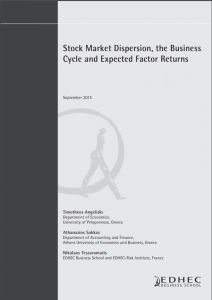

Stock Market Dispersion, the Business Cycle and Expected Factor Returns
This paper provides evidence using data from the G7 countries suggesting that return dispersion may serve as an economic state variable in that it reliably predicts time-variation in economic activity, market returns, the value and momentum premia and market volatility. A relatively high return dispersion predicts a deterioration in business conditions, a higher value premium, a smaller momentum premium and lower market returns. The evidence is robust to alternative specifications of return dispersion and is not driven by US data. Return dispersion conveys incremental information relative to idiosyncratic risk. A revisited version of this paper was published in the October 2015 issue of the Journal of Banking & Finance.
Author(s):
Summary:
This paper provides evidence using data from the G7 countries suggesting that return dispersion may serve as an economic state variable in that it reliably predicts time-variation in economic activity, market returns, the value and momentum premia and market volatility. A relatively high return dispersion predicts a deterioration in business conditions, a higher value premium, a smaller momentum premium and lower market returns. The evidence is robust to alternative specifications of return dispersion and is not driven by US data. Return dispersion conveys incremental information relative to idiosyncratic risk. A revisited version of this paper was published in the October 2015 issue of the Journal of Banking & Finance.
Register to download PDF
Register/Log in| Type : | Working paper |
|---|---|
| Date : | 14/09/2015 |
| Keywords : |
Risk Management |

